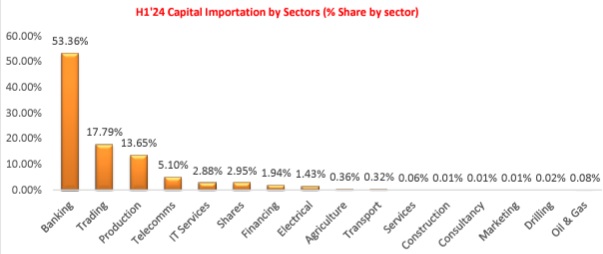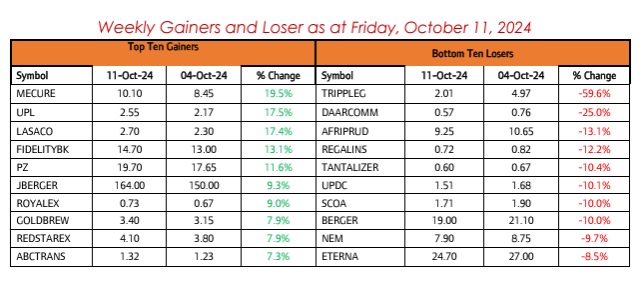Discover how Nigeria’s capital inflow surged by 177% in H1 2024, driven by booming portfolio investments and elevated interest rates attracting foreign investors. Gain insights into stock market trends and the economic outlook.
Nigeria attracted a total capital inflow worth $5.98 billion in H1 2024, a 177% YoY increase from $2.16 billion in H1 2023. This growth was driven by a 360% YoY growth in Portfolio investments into Nigeria to $3.48 billion and an 85% YoY surge in other investments to $2.35 billion. Foreign direct investments also saw a 12% YoY increase to $149 million under six months of 2024. The recorded growth could be attributed to the elevated interest rates in Nigeria, which attracted foreign investors seeking higher investment returns.
In H1 2024, 77% of foreign portfolio investments (FPIs) were allocated to treasury bills, OMO bills, and commercial papers. Private companies also tapped into these favorable conditions, issuing commercial papers at higher discount rates. Bonds attracted $599 million in FPIs during H1 2024, with $420.8 million invested in Q1 alone. This strong performance in the money market and debt instruments indicates the critical role of elevated interest rates in attracting foreign capital to Nigeria.

The Banking, Trading, and Production sectors maintained their position as top investment sectors, gaining 53.4%, 17.8%, and 13.7% shares of $5.98 billion in imported capital during the first six months of 2024. In Q2 2024, capital importation increased by 152.81% from $1.03 billion in Q2 2023, but a 22.85% decline from $3.38 billion in Q1 2024. The banking sector led with the highest inflows at $1.12 billion, followed by the Production/Manufacturing sector at $624.71 million and the Trading sector at $569.22 million.
Stock Market
The Nigerian equities market experienced a modest recovery this week, with the All-Share Index (ASI) posting a 0.09% weekly gain to close at 97,606.63 points. This was driven by selective buying across sectors, as investors responded to attractive entry points in key mid and large-cap stocks. The market capitalization also saw a marginal increase to N56.09 trillion, resulting in a weekly gain of N49.53 billion for equity investors.

However, market momentum was weak due to higher traded volumes, driven by rebalancing activities across small, mid, and large-cap stocks. The weekly trade value nosedived by 76.24% to N31.51 billion, while traded volumes reversed last week’s decline by 3.92% to 2.97 billion shares, a 7.5% increase from the previous week. Sectoral performance was mixed, with Banking, Insurance, and Oil & Gas gains. Overall trading activity remained subdued, reflecting cautious sentiment ahead of key macroeconomic reports, including the September 2024 inflation figures.
Conclusion
The Nigerian economy faces a decline in total capital inflow, causing an exodus of investors from critical sectors and regions. Despite a positive year-on-year increase in total capital imported during the year’s first half, the momentum is at risk of reversal due to persistent foreign exchange challenges. Monetary and fiscal authorities must implement targeted policies to resolve these issues and improve the ease of doing business in Nigeria to attract long-term and short-term investors and position the country as a more competitive investment destination.
This week’s modest gains in trading indicate a return of investor confidence, with expectations of further rebounds due to anticipated earnings releases and government reforms’ impact on economic growth. The trend of mild gains is expected to continue, with investors advised to focus on fundamentally sound stocks.
Comment, Like 👍, share this article, and Follow us on our social media handles.








